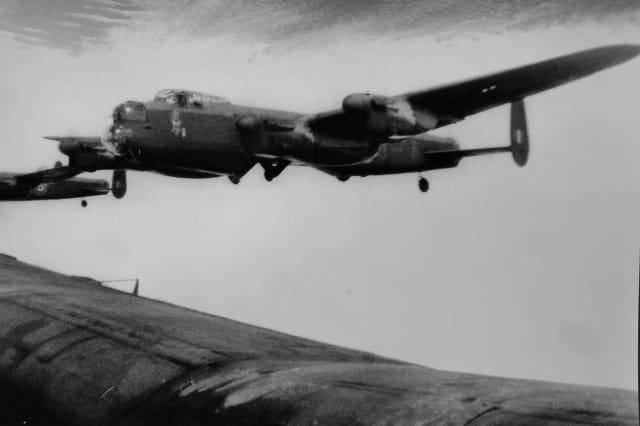Fitting that 617 Squadron should fly cutting-edge jet, says last Dambuster

Britain's last surviving Dambuster said he thinks it is fitting that his former squadron should operate the cutting-edge F-35 Lightning fighter jets.
Squadron Leader George "Johnny" Johnson was part of 617 Squadron, which carried out a night of raids on German dams in 1943 in an effort to disable Hitler's industrial heartland.
Almost 75 years to the day since Operation Chastise, the 96-year-old said the anniversary on Thursday night and Friday morning emphasises the importance of the raid and acts as a reminder for younger generations.

Pressed for his thoughts on the stealth warplanes, the Lincolnshire-born veteran, who lives in Bristol, said: "I am not conversant with the technology of the F-35, but I think it is fitting that 617 should be the squadron to receive it."
When asked what advice he would offer to the current aircrew in his former squadron, he said: "Do your utmost to maintain the performance and prestige of the squadron."
In the seven-and-a-half decades since Operation Chastise on the night of May 16/17, in a usual RAF process, 617 Squadron has been disbanded and reformed as it moved from operating the Lancaster to the Vulcan and Tornado.
Last month, the squadron was officially stood back up as the UK's first F-35 Lightning squadron - to be based at RAF Marham in Norfolk.

The officer commanding 617 Squadron, Wing Commander John Butcher, whose grandfather flew Lancasters, has previously said the aircrew of 1943 would be "quite amazed" by the jets.
He told the Press Association last year that he can see a lot of parallels between the current and original squadron in that the aim was and is to "bring cutting-edge technology into service for a very special mission".
Mr Johnson served as a bomb aimer on the night 617 Squadron used Barnes Wallis's revolutionary bouncing bombs during the daring mission - releasing them 60ft above the ground.
His crew was one of five selected to target the Sorpe dam, and had to fly along its length at as low an altitude as possible and drop the bomb in the centre.
And although Mr Johnson's aircrew did not destroy their target, the Germans had to empty the dam to repair it, causing major disruption to the war effort.
Asked about the most significant thing he remembers from the night of the raids, he said: "It was an exhilarating feeling, flying low level into the Ruhr Valley in bright moonlight.
"Once we had recovered from the early disappointment of the target - the Sorpe didn't require us to spin the bomb or use any of our practised techniques - the most significant memory was the sight of the burst Mohne dam as we flew home, the huge lack of water which was still pouring out of the reservoir some 20 minutes after breach."
A total of 133 Allied aircrew left for the raid on board 19 Lancaster bombers from RAF Scampton, led by Wing Commander Guy Gibson, but during the mission 53 men were killed and three were captured.
Mr Johnson said the significance of the raid was only realised the next day when they "discovered they had achieved something that the German hierarchy had not deemed possible".
"We also seemed to raise public morale back home," he added.

Mr Johnson's friend, TV presenter Carol Vorderman, who petitioned for him to get a knighthood and was later awarded an MBE, said the Dambusters raid was "one of the most audacious air attacks in history".
During a visit to Udvar Hazy, the national air and space museum in the United States, Vorderman, a trained pilot herself, said she saw aircraft which included German planes that were being designed and developed, and could shoot upwards.
"The Germans had this incredible technical knowledge and capacity. I believe, had the war gone on for another period of time, then it could have turned back against us," Vorderman, an honorary Group Captain in the RAF, said.
"The Dambusters raid stopped German production fundamentally for a number of months - the importance of what they did was critical in the war.
"It really could have ended very differently if that had not taken place... Without Bomber Command we wouldn't be living the lives that we live today."


